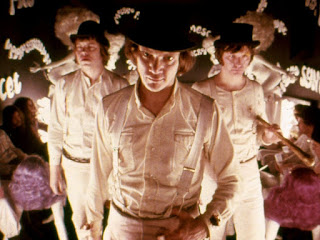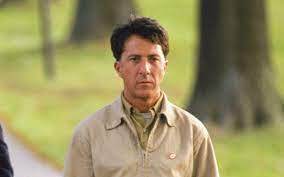The Dark Knight Trilogy: Constructing A Perfect Hero
As someone
who has loved superhero films for a long time, it is impossible to ignore how
great Christopher Nolan’s ‘Dark Knight Trilogy’ is. These films have been
praised endlessly for their story, acting and dark tone. By this point it feels
that any more discussion about them wouldn’t bring anything new to the table.
However, today I want to explore something that I feel is often overlooked
about the films. How their take on Batman/ Bruce Wayne (portrayed by Christian
Bale) was the perfect hero for his time.
Before
discussing this, I think it is important to briefly explain the history of
Batman films why the trilogy exists. In 1989 Tim Burton directed ‘Batman’,
followed by ‘Batman Returns’ in 1992. These two films were met with a lot of
praise for their dark, gothic tone and are seen as largely responsible for
making Batman into a more serious character compared to his 1966 TV series
counterpart. Despite this, Burton stepped down as director after ‘Batman
Returns’, mainly due to Warner Bros. trying to push the franchise in a more
family friendly direction to sell more merchandise. The next two instalments in
the franchise, ‘Batman Forever’ (1995) and ‘Batman and Robin’ (1997) were
directed by Joel Schumacher and proved to be a turn-off for audiences. These
two films undid Tim Burton’s work of creating a dark, brooding character and
returned the franchise to its older, camper, and pun-filled past. After the
backlash of Schumacher’s duology, the Batman film franchise went on hiatus
until after many failed pitches, Christopher Nolan was able to reboot the
series. This culminated in the release of ‘Batman Begins’ in 2005, which was
met with critical acclaim and brought the franchise back to its darker and more
serious roots. This success would only continue to grow with the second and
third films in the trilogy, ‘The Dark Knight’ (2008) and ‘The Dark Knight
Rises’ (2012).
As I’ve mentioned, ‘The Dark Knight Trilogy’
is heavily defined by its dark and serious tone and this is one of the ways
that the series is able to construct the perfect hero for the time. By the
mid-2000’s it was clear that audiences were largely growing tired of the
campier superhero films that were released, with films such as Schumacher’s
previously mentioned Batman duology and Fantastic Four (2005) being met with a
negative reception from critics and audiences. Whilst films like the early
X-Men films had experimented with a more serious tone, I believe Nolan’s
trilogy truly showed the potential darker and grittier superhero films had. Batman
is a character that is quite easy to place in the real world, he lacks
superpowers so instead uses his wealth and intellect to create gadgets for
fighting crime. Because of this the character can be easily placed into a
realistic setting without losing the core of the character, resulting in a film
that is accessible for both mainstream audiences and long-time comic book fans.
After the success ‘Batman Begins’ had with this formula, other films attempted
to follow the same route of making more serious superhero films. A media
theorist called Steve Neale proposed the idea that whilst genres have set
conventions, these tropes can be changed over time, which is what ‘The Dark
Knight Trilogy’ did for comic book films. After its release several films aiming
to replicate its style were released, such as ‘Daredevil’ (2006) and Watchmen
(2009). Even the more light-hearted superhero films seemed to take cues from
it, with 'Spider-man 3' (2007) seeing the character wear a black costume and Iron
Man (2008) starting the Marvel Cinematic Universe in a much more grounded style
than the subsequent films.
Another
reason why I feel these films created such a culturally relevant character is
that they reflect 2000’s society. It’s important to note that the film trilogy
started only a few years after 9/11, an event that shook people’s perception of
the world and what they should be afraid of. As fear is such a crucial part of
Batman’s character (he uses his own phobia of bats to terrorise villains) he
can be used as the perfect vehicle to confront these modern fears. As opposed
to the eccentric mobsters and superpowered criminals of previous Batman media,
these films pit Bruce Wayne against more realistic, and as a result more
terrifying, villains. In ‘Batman Begins’, the main villain is the League of
Shadows, a mysterious organisation based in Asia who are determined to create a
new world order, a description that draws many parallels to terrorist
organisations. Additionally in ‘The Dark Knight’, Batman faces The Joker (an iconic
performance by Heath Ledger), no longer portrayed as a just a wisecracking
clown but a mass terrorist with no real goal but spreading anarchy. Finally,
‘The Dark Knight Rises’ sees the mercenary Bane (Tom Hardy) defeat Batman,
allowing the remains of the League of Shadows to take over Gotham City,
resulting in the city becoming an almost terrorist state. Yet despite all odds
being against him, Batman defeats the villains, no matter the physical or
mental damage he suffers. By doing this Christopher Nolan turns Batman into
more than just another superhero and makes him a symbol of hope for the
audience, delivering the optimistic message of triumph over modern evils.
With all
that said, I don’t believe Christian Bale’s Batman is the perfect hero for modern
times. Despite how instrumental his trilogy was in making audiences and
producers take superhero films more seriously, the genre has dramatically moved
on from this concept. Just looking at more recent releases we can see that
films about larger-than-life heroes such as Marvel’s ‘Avengers’ series are
audience’s new favourites. I believe there are two main reasons for this. One
of these reasons is that much like the way audiences grew tired of the camper
superhero films, they also grew tired of their darker counterparts. This was likely not helped by the negative
reception to films such as ‘Daredevil’ (2006) and some of the later ‘X-Men’
films. Another reason for this change could be due to changing social contexts.
Part of what made ‘The Dark Knight Trilogy’ so good was how it used the Batman
mythos to confront issues such as terrorism, however, as society has moved on
from 9/11, the message of the films may be less impactful to a modern audience.
Regardless of the reasoning, it’s clear to see that in an age where
family-friendly superhero blockbusters are ever more popular, those gritty
adaptations have lost their resonance with mainstream audiences.
In
conclusion, by blending the Batman narrative with a grounded setting and
real-world issues, Christopher Nolan’s ‘Dark Knight Trilogy’ created a hero
that was ideal for its time. Whilst it may seem that modern superhero films
have opted for a brighter and more fantastical style, it’s clear these darker,
more grown-up, films have had a lasting impact on the genre. All three films
are still considered by many to be some of the best superhero films ever made,
with ‘The Dark Knight’ still being the highest rated superhero film on IMDB.
Furthermore, whilst less common than before, a lot of superhero media is still
inspired by this trilogy, such as Netflix’s critically acclaimed ‘Daredevil’ TV
series (2018). With the much-anticipated film ‘The Batman’ (2022) seemingly
taking a more down-to-earth approach to the character again, I look forward to
seeing a potential return to the darker style of superhero films.




I haven’t seen this one but it looks like it’s one to add to the list of ones to watch!
ReplyDeleteI’ve seen all these films and loved the dark undertones, much more than the previous Batman films (although Michael Keaton was good, the George Clooney version was appalling!). I hadn’t even thought about why they worked so well but thinking back, it makes total sense. Having been to New York many times, before, immediately after and years later too, 9/11 happened to the world affecting us all, turning it to a darker place in need of real life heroes to rid the world of villains (& terrorists). Even though the superhero franchise has turned back to a more comedic touch, I still think the darker ones work best (like Venom etc). Loving your perspectives on these films - it’s taken me a good few days to digest and think about your views before I commented!
ReplyDelete